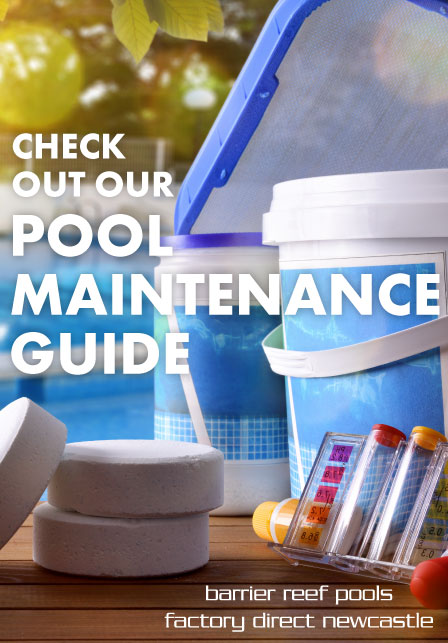Everything You Need To Know About Pool Filters
When it comes to fibreglass pool maintenance, pool filters play a vital role in ensuring pristine water quality. These indispensable components diligently work to keep the water clean, crystal clear, and optimally safe for swimming. By efficiently removing impurities like dust, dirt, and debris, pool filters contribute to a refreshing and enjoyable swimming experience for all.
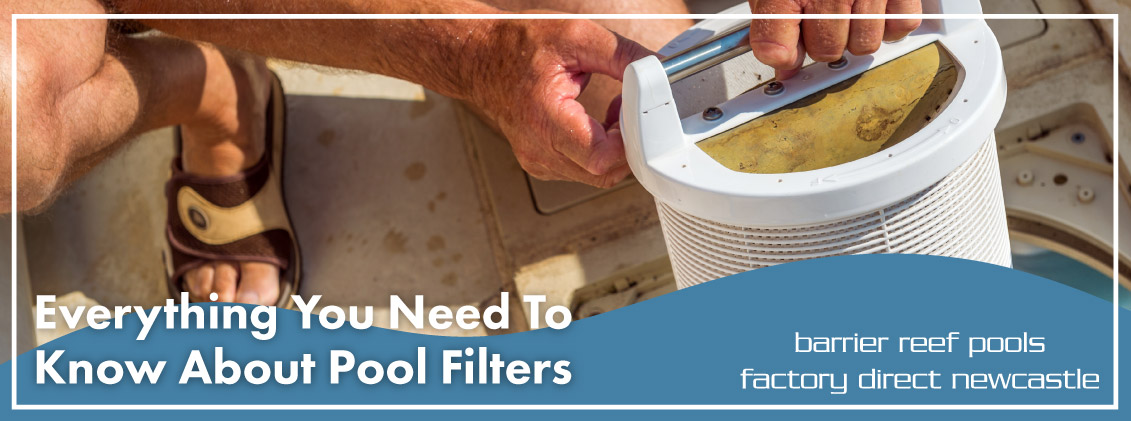
Types of Pool Filters
There are three main types of pool filters: sand, cartridge, and diatomaceous earth (DE). Each type operates in a distinct and unique way, showcasing its own set of characteristics and functionalities that set it apart from others.
Sand Filters
These filters use a bed of sand to effectively filter dirt and particles from water. The water is pushed through a sand-filled filter, where the sand acts as a medium to capture and remove impurities. The sand bed provides a large surface area for filtration, ensuring thorough cleaning of the water. With its abrasive nature, the sand also aids in the removal of organic matter and debris, resulting in crystal clear water that is safe for swimming and other activities.
Cartridge Filters
A cartridge filter operates by allowing water to flow through a filter material, typically made of pleated fabric or paper, that captures particles and contaminants. The cartridge can be easily removed and cleaned, making it a convenient and popular choice for pool owners. The filter material in the cartridge provides a fine mesh that effectively traps debris, ensuring clean and clear water. The pleated design increases the surface area of the filter, allowing for a higher capacity and longer filter life. Additionally, the pleats provide a more efficient filtration process, reducing the need for frequent cleaning and maintenance.
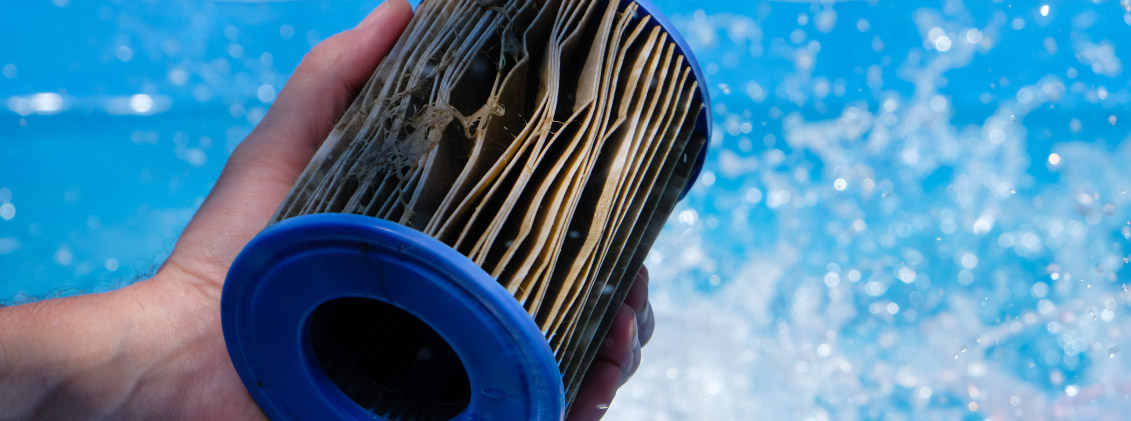
Diatomaceous Earth Filters
Considered to be the most effective type of filter, diatomaceous earth filters utilise a powdered form of fossilised diatoms to create a fine mesh filter. These microscopic diatoms have intricate skeletal structures that form a porous and highly efficient filtration system. The diatomaceous earth powder coats a mesh or grid within the filter, allowing it to capture even the smallest particles and impurities in the water. This advanced filtration technology ensures exceptional water clarity and purity. The unique properties of diatomaceous earth also contribute to its ability to remove oils, lotions, and other contaminants, making it an ideal choice for maintaining pristine pool water.
Choosing The Right Pool Filter
When it comes to choosing the right pool filter, there are different factors to consider. First, you need to take into account the size of the pool. A larger pool will require a filter that can handle a higher volume of water. Secondly, consider the amount of use the pool gets. If the pool is frequently used by many people, you will want a filter that is designed to handle heavy usage. Lastly, the local climate plays a role in the decision-making process. If the pool is located in a dusty environment, a sand or DE filter would be beneficial as they are capable of effectively capturing and removing a large volume of dirt. So, take the time to carefully assess these factors before making a decision on which pool filter to choose. It will ensure that you have a clean and enjoyable swimming experience all season long.
Maintenance of Pool Filters
Regular maintenance of your pool filter is of utmost importance to guarantee optimal efficiency and long-lasting performance. This involves frequent cleaning to remove debris and build-up, timely replacement of worn-out parts to prevent malfunctioning, and, for sand and DE filters, periodic replacement of the filtering medium to maintain the highest level of filtration. By diligently following these maintenance practices, you can ensure that your pool filter operates at its best, providing you with crystal-clear water for countless enjoyable swims.
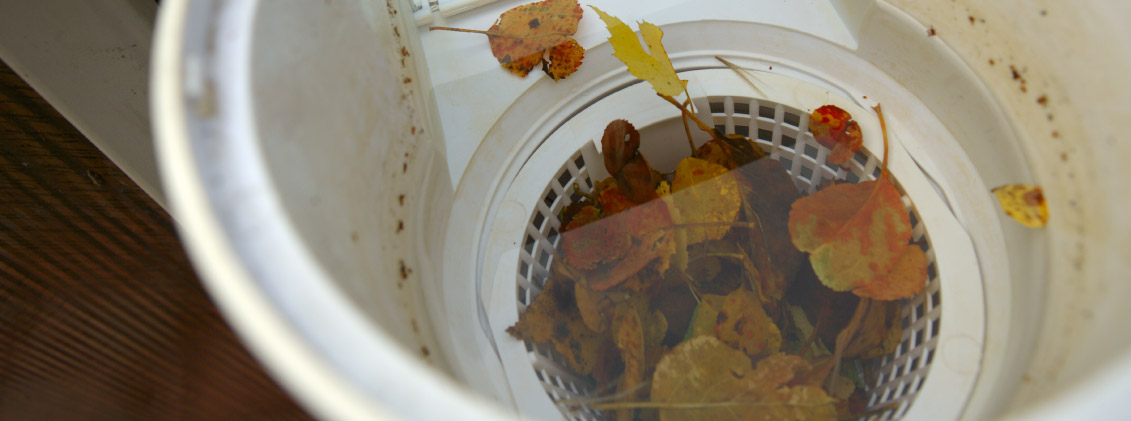
How To Maintain Your Pool Filter?
Maintaining your pool filter is a straightforward task once you understand the process. Here are some steps to help you:
Regular Cleaning: Depending on the type of filter you have, you should clean it every 1-3 months. For cartridge filters, remove the cartridge and rinse it with a garden hose to remove debris. For sand and DE filters, backwashing is an effective cleaning method. Simply reverse the flow of water through the filter to wash out the dirt.
Check for Damage: Regularly inspect your filter for any signs of wear and tear. Look out for damage in the cartridges or sand/DE medium. If you notice any problems, it’s best to replace these parts promptly to avoid further damage or inefficient operation.
Change the Filtering Medium: For sand and DE filters, it’s important to replace the sand or DE powder every 5-7 years. This ensures that the filtering medium remains effective at trapping debris.
Monitor Pressure Gauges: Your filter’s pressure gauge is a useful tool in determining its cleanliness. A significant increase in pressure typically indicates a clogged filter that needs cleaning or replacing.
By incorporating these practices into your pool maintenance routine, you’ll be able to extend the lifespan of your filter, thus ensuring a clean and healthy swimming environment in your fibreglass pool.
Conclusion
Pool filters play a crucial role in maintaining the hygiene and clarity of your fibreglass pool. By effectively removing impurities and debris, they ensure that your pool water remains clean and inviting. Understanding the different types of filters, such as sand, cartridge, and diatomaceous earth filters, along with their specific maintenance requirements, allows you to make an informed decision when it comes to pool care. Regular cleaning and maintenance of your pool filter not only prolong its lifespan but also ensure optimal filtration performance. Remember, a clean and well-maintained filter means a clean pool, contributing to a safe and enjoyable swimming experience for all. So, invest your time and effort in proper filter care to reap the rewards of clear water and a sparkling pool.
Looking to upgrade your backyard space? At Newcastle Swimming Pools, we provide you with quality made fibreglass pools in a range of different sizes and designs. Contact Newcastle Swimming Pools today for a free quote!
Everything You Need To Know About Pool Filters
When it comes to fibreglass pool maintenance, pool filters play a vital role in ensuring pristine water quality. These indispensable components diligently work to keep the water clean, crystal clear, and optimally safe for swimming. By efficiently removing impurities like dust, dirt, and debris, pool filters contribute to a refreshing and enjoyable swimming experience for all.
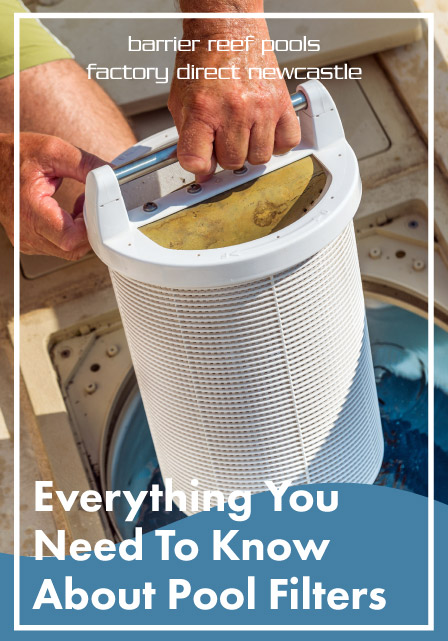
Types of Pool Filters
There are three main types of pool filters: sand, cartridge, and diatomaceous earth (DE). Each type operates in a distinct and unique way, showcasing its own set of characteristics and functionalities that set it apart from others.
Sand Filters
These filters use a bed of sand to effectively filter dirt and particles from water. The water is pushed through a sand-filled filter, where the sand acts as a medium to capture and remove impurities. The sand bed provides a large surface area for filtration, ensuring thorough cleaning of the water. With its abrasive nature, the sand also aids in the removal of organic matter and debris, resulting in crystal clear water that is safe for swimming and other activities.
Cartridge Filters
A cartridge filter operates by allowing water to flow through a filter material, typically made of pleated fabric or paper, that captures particles and contaminants. The cartridge can be easily removed and cleaned, making it a convenient and popular choice for pool owners. The filter material in the cartridge provides a fine mesh that effectively traps debris, ensuring clean and clear water. The pleated design increases the surface area of the filter, allowing for a higher capacity and longer filter life. Additionally, the pleats provide a more efficient filtration process, reducing the need for frequent cleaning and maintenance.
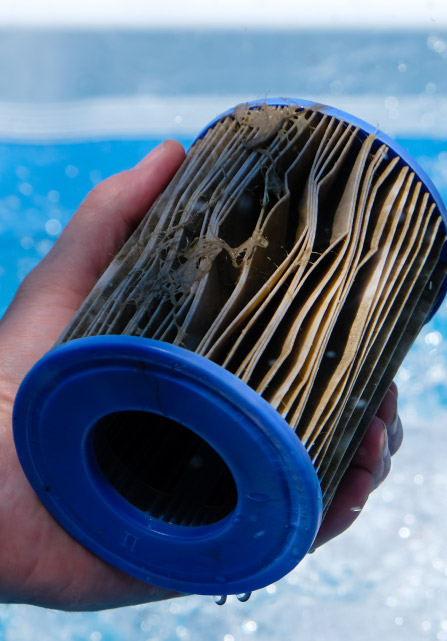
Diatomaceous Earth Filters
Considered to be the most effective type of filter, diatomaceous earth filters utilise a powdered form of fossilised diatoms to create a fine mesh filter. These microscopic diatoms have intricate skeletal structures that form a porous and highly efficient filtration system. The diatomaceous earth powder coats a mesh or grid within the filter, allowing it to capture even the smallest particles and impurities in the water. This advanced filtration technology ensures exceptional water clarity and purity. The unique properties of diatomaceous earth also contribute to its ability to remove oils, lotions, and other contaminants, making it an ideal choice for maintaining pristine pool water.
Choosing The Right Pool Filter
When it comes to choosing the right pool filter, there are different factors to consider. First, you need to take into account the size of the pool. A larger pool will require a filter that can handle a higher volume of water. Secondly, consider the amount of use the pool gets. If the pool is frequently used by many people, you will want a filter that is designed to handle heavy usage. Lastly, the local climate plays a role in the decision-making process. If the pool is located in a dusty environment, a sand or DE filter would be beneficial as they are capable of effectively capturing and removing a large volume of dirt. So, take the time to carefully assess these factors before making a decision on which pool filter to choose. It will ensure that you have a clean and enjoyable swimming experience all season long.
Maintenance of Pool Filters
Regular maintenance of your pool filter is of utmost importance to guarantee optimal efficiency and long-lasting performance. This involves frequent cleaning to remove debris and build-up, timely replacement of worn-out parts to prevent malfunctioning, and, for sand and DE filters, periodic replacement of the filtering medium to maintain the highest level of filtration. By diligently following these maintenance practices, you can ensure that your pool filter operates at its best, providing you with crystal-clear water for countless enjoyable swims.
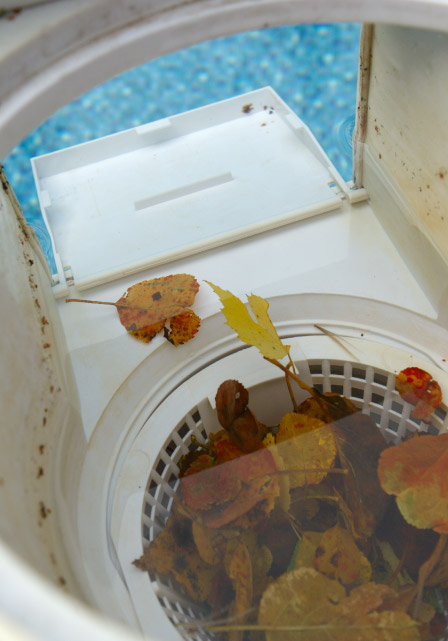
How To Maintain Your Pool Filter?
Maintaining your pool filter is a straightforward task once you understand the process. Here are some steps to help you:
Regular Cleaning: Depending on the type of filter you have, you should clean it every 1-3 months. For cartridge filters, remove the cartridge and rinse it with a garden hose to remove debris. For sand and DE filters, backwashing is an effective cleaning method. Simply reverse the flow of water through the filter to wash out the dirt.
Check for Damage: Regularly inspect your filter for any signs of wear and tear. Look out for damage in the cartridges or sand/DE medium. If you notice any problems, it’s best to replace these parts promptly to avoid further damage or inefficient operation.
Change the Filtering Medium: For sand and DE filters, it’s important to replace the sand or DE powder every 5-7 years. This ensures that the filtering medium remains effective at trapping debris.
Monitor Pressure Gauges: Your filter’s pressure gauge is a useful tool in determining its cleanliness. A significant increase in pressure typically indicates a clogged filter that needs cleaning or replacing.
By incorporating these practices into your pool maintenance routine, you’ll be able to extend the lifespan of your filter, thus ensuring a clean and healthy swimming environment in your fibreglass pool.
Conclusion
Pool filters play a crucial role in maintaining the hygiene and clarity of your fibreglass pool. By effectively removing impurities and debris, they ensure that your pool water remains clean and inviting. Understanding the different types of filters, such as sand, cartridge, and diatomaceous earth filters, along with their specific maintenance requirements, allows you to make an informed decision when it comes to pool care. Regular cleaning and maintenance of your pool filter not only prolong its lifespan but also ensure optimal filtration performance. Remember, a clean and well-maintained filter means a clean pool, contributing to a safe and enjoyable swimming experience for all. So, invest your time and effort in proper filter care to reap the rewards of clear water and a sparkling pool.
Looking to upgrade your backyard space? At Newcastle Swimming Pools, we provide you with quality made fibreglass pools in a range of different sizes and designs. Contact Newcastle Swimming Pools today for a free quote!


